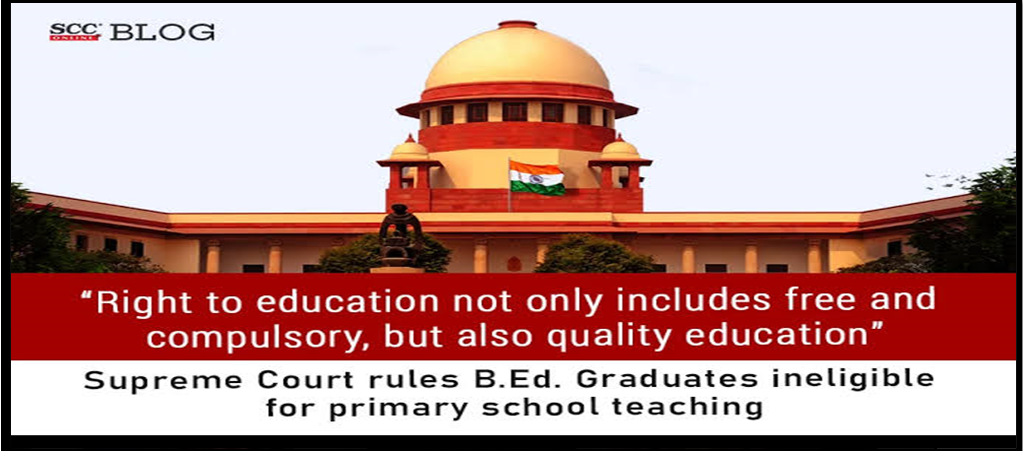A RULING THAT GIVES PRIMARY SCHOOL TEACHING A NEW SLATE
Syllabus:
- GS 2 : Issues Relating to Development and Management of Social Sector/Services relating to Education and Human Resources
Focus:
- In a landmark ruling in August 2023, the Supreme Court of India endorsed the decision of the Rajasthan High Court, asserting that the Bachelor of Education (B.Ed) degree is not suitable for primary school teaching.
- Instead, the court emphasized the importance of the Diploma in Education (DEd), Diploma in Elementary Education (DElEd), or Bachelor of Elementary Education (BElEd) for this critical educational level.
Source: SCC online
Implications of the Ruling:
Different Requirements for Primary Teaching:
- Teaching foundational literacy and numeracy demands specialized skills not covered by the B.Ed degree.
- Autobiographical memory and general communication skills are insufficient for the unique challenges of primary education.
Relevance to Right to Education Act:
- The Right to Education Act 2009 underscores the necessity for professional qualifications specific to the teaching level.
- Despite this, B.Ed graduates have been employed for primary education roles, violating the act’s intent.
| About Right to Education Act
Constitutional Evolution: · Initially, under Part IV of the Indian Constitution, Articles 45 and 39 (f) of the Directive Principles of State Policy (DPSP) advocated for state-funded and accessible education. · The Ramamurti Committee Report in 1990 marked the first official document on the Right to Education. · In 1993, the Supreme Court’s pivotal ruling in Unnikrishnan JP vs State of Andhra Pradesh & Others recognized education as a Fundamental Right under Article 21. · The Tapas Majumdar Committee (1999) recommended the insertion of Article 21A. · The 86th Amendment in 2002 introduced the Right to Education as a fundamental right for children aged 6-14 under Part III of the Constitution, alongside Article 21A. Features of the RTE Act, 2009: · The RTE Act aims to provide primary education to all children aged 6 to 14. · It enforces education as a Fundamental Right (Article 21). · Mandates 25% reservation for disadvantaged sections including SCs, STs, socially backward classes, and differently-abled. · Provides for admission of non-enrolled children to age-appropriate classes. · Outlines sharing of financial and other responsibilities between Central and State Governments. · Sets norms for Pupil Teacher Ratios, infrastructure, school days, and teacher hours. · Initially included a “No Detention Policy,” removed by the 2019 amendment. · Prohibits teacher deployment for non-educational tasks except in specific circumstances like elections or disaster relief efforts. |
Current Scenario:
- Teacher Qualifications Overview:
- The State of Teachers, Teaching and Teacher Education Report 2023 (SoTTTER-23) indicates that 90% of teachers possess some form of professional qualification.
- However, only 46% of primary grade teachers hold DElEd or equivalent qualifications, while 30% have B.Ed degrees, and 10% lack professional qualifications.
- Disparities in Private Sector:
- In private unaided primary schools, 43% of teachers have B.Ed degrees, and 17% lack any professional qualification.
- Elite English medium schools exhibit a mere 24% of teachers with DElEd or equivalent qualifications.
Addressing Anomalies:
- Supply Enhancement:
- Focus on increasing the availability of high-quality DEd/DElEd/BElEd programs.
- Government-funded institutions, such as District Institutes of Education and Training (DIETs), exhibit better quality compared to self-financed alternatives.
- Quality Concerns:
- Teacher Eligibility Test (TET) data underscores the need for higher quality in the self-financed sector.
- Government support and regulation are crucial to enhancing quality and curbing corruption.
Government Initiatives:
- Integrated Teacher Education Programme (ITEP):
Launched to enhance teacher preparation for primary education through specialized training and curriculum development.
- Scheme of Pandit Madan Mohan Malaviya National Mission on Teachers & Teaching:
Aims to strengthen teacher education in the country, focusing on primary teacher training and professional development.
- Ministry of Education Initiatives:
Various programs to bolster District Institutes of Education and Training (DIETs), providing resources and support for primary teacher education.
- National Council for Teacher Education (NCTE) Regulations:
Regular updates and guidelines to ensure quality standards in primary teacher training programs.
- Financial Support:
Allocation of funds in the national budget to incentivize innovation and improvement in primary teacher education infrastructure and curriculum development.
- Scholarship Programs:
Providing scholarships and financial assistance to encourage aspiring teachers to pursue specialized primary education training programs.
Way Forward / Proposed Reforms:
- Limit the Bar Council of India’s regulatory authority to basic eligibility for legal practice.
- Establish the National Council for Legal Education and Research (NCLER) for comprehensive oversight of post-graduate legal education.
- Focus on Research and Pedagogy
- Strengthen government support and innovation in primary teacher education.
- Promote innovative programs and initiatives, such as BElEd by Delhi University and the Integrated Teacher Education Programme (ITEP).
- Craft innovative programs providing pathways for B.Ed holders to gain professional development for primary teaching.
- Recognize the value of diverse life experiences in the teaching profession.
- The government’s commitment to teacher education must extend beyond higher education, ensuring comprehensive support for primary teacher preparation.
- The recently announced Integrated Teacher Education Programme (ITEP) should focus more on preparatory and foundational stages.
- Government support and incentives are essential for strengthening primary/preparatory stage teacher education.
Conclusion:
In conclusion, the Supreme Court’s ruling serves as a catalyst for addressing anomalies in primary school teaching qualifications. Reforms in supply enhancement, quality control, and innovative programs are imperative. This paradigm shift is crucial for nurturing competent educators and providing quality education at the foundational level.
Source:
Mains Practice Question:
Evaluate the challenges in ensuring appropriate qualifications for primary school teachers and suggest measures to enhance the quality of teacher education in the primary education sector.




